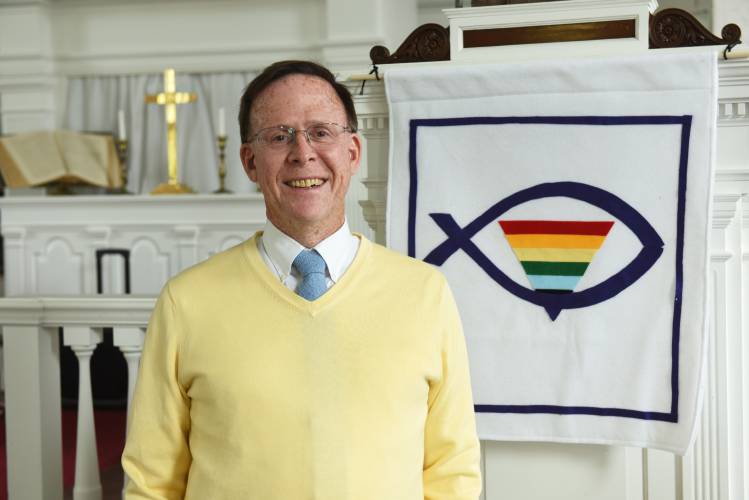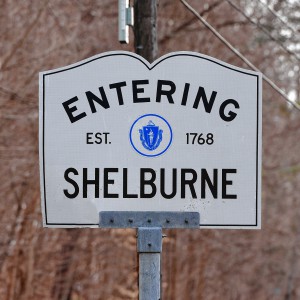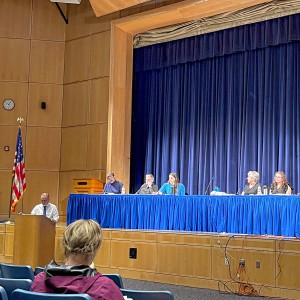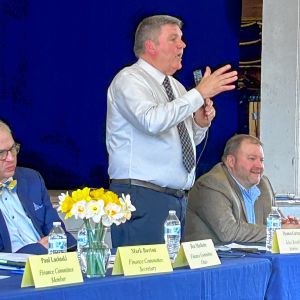Faith Matters: A pastor celebrating Passover: Unmasking false theology that has been used to justify antisemitism

The Rev. Randy Calvo at the First Congregational Church of Sunderland, United Church of Christ. STAFF PHOTO/PAUL FRANZ
| Published: 04-26-2024 12:15 PM |
This weekend, Jews are celebrating the feast of Passover. Passover began at sundown this past Monday and ends at sundown this coming Tuesday. Usually, Passover and Easter coincide on the calendar. However, this is a Jewish leap year. The Jewish calendar is based on the lunar cycle. In order to maintain the seasonal affiliation of the Jewish feasts, an extra month must be added to certain years in order to compensate for the lunar year being 11 days shorter than the solar year. This is why Easter and Passover are weeks apart this year.
However, this separation allows me the opportunity to accept a very gracious invitation from a friend to join in her Passover Seder, to join with her family and friends in the intimacy of her home as we remember God’s liberation of the Israelites from Egyptian slavery. When Passover and Easter share proximate dates on the calendar, Holy Week responsibilities make acceptance of such an invitation almost impossible for me. Since this article needs to be submitted to the Recorder a week in advance, I cannot share my experiences from the evening of April 22, but I can share some of the backstory.
The Sunderland Congregational Church, United Church of Christ, is a member of the Sunderland Human Rights Task Force, which emerged in response to the murder of George Floyd on May 25, 2020. These are those stalwart souls at the intersection of Routes 47 and 116 in Sunderland every Monday morning.
A subgroup of the Task Force was organized to deal with the dramatically increasing cases of antisemitism in the United States, up 140% this year. The Sunderland Church was eager to be an active participant in planning and presenting such a program, and we are proudly its cosponsor. The church voted also to purchase an outdoor banner declaring, “Churches for Middle East Peace.” Both the Task Force and the church realize that there is a distinction between supporting or opposing Israel’s governmental policy at any given time, and opposing antisemitism all the time.
Here I speak for myself. I feel obligated to work against antisemitism because as a church pastor, as an ordained representative of the church, I am ashamed of the church’s and Christianity’s historical role in persecuting Jews. For the longest time I was naïve about the systemic Christian attacks on Jews and Judaism.
For me, Lent is the holiest time of the year. The willingness of Jesus to accept crucifixion remains for me the ultimate testimony of God’s ineffable love for all people. I saw in it only the good and holy. Then, I was confronted by Marc Chagall’s painting, “White Crucifixion.” I never realized until then that Lent and Good Friday were terrifying prospects for Jewish communities through the centuries, times when violent antisemitism would be instigated and condoned by the church’s theology and preaching, and also that the Jewish Jesus who lives at the center of my faith suffered along with every antisemitic insult and attack.
Then, I visited the Lenox Library this past summer and purchased “Constantine’s Sword: The Church and the Jews” by James Carroll, which was his own story of discovering the scandalous history of institutional Christian antisemitism. Almost as soon as Christians had power it was used against the Jews. And unfortunately, some of this was justified by Gospel passages. I understand the exegesis behind John 8:44 and Matthew 27:25, but in purposeful isolation they are damaging texts that have been co-opted to justify generational bigotry.
A more unbiased reading of Jesus’ story is that he was executed by the powerful. Marcus Borg and John Dominic Crossan write of competing processions into Jerusalem on what is now known as Palm Sunday. In a well-orchestrated march, the Roman governor Pontius Pilate entered the city from the west leading imperial cavalry and soldiers representing the violent power of the empire, while a spontaneous peasant protest ushered Jesus into Jerusalem from the east, with Jesus choosing symbols of peace (Matthew 21:5 // Zechariah 9:9-10).
Article continues after...
Yesterday's Most Read Articles
 Bridge of Flowers in Shelburne Falls to open on plant sale day, May 11
Bridge of Flowers in Shelburne Falls to open on plant sale day, May 11
 Serious barn fire averted due to quick response in Shelburne
Serious barn fire averted due to quick response in Shelburne
 $12.14M school budget draws discussion at Montague Town Meeting
$12.14M school budget draws discussion at Montague Town Meeting
 As I See It: Between Israel and Palestine: Which side should we be on, and why?
As I See It: Between Israel and Palestine: Which side should we be on, and why?
 Greenfield homicide victim to be memorialized in Pittsfield
Greenfield homicide victim to be memorialized in Pittsfield
 ‘We are among the leaders’: Ashfield Town Meeting voters pass bevy of clean energy proposals
‘We are among the leaders’: Ashfield Town Meeting voters pass bevy of clean energy proposals
It was the powerful who executed Jesus. These are often the enemy of Jesus’ ministry, his care and compassion for all people, especially the powerless. It was, however, far more expedient to blame the Jews from the time the New Testament was being written, through the ages and to the present.
I will attend the Passover Seder and share in the powerful message of God’s liberation, and share it with people whose faith is as valid and sacred as it ever was. My faith does not supersede their faith. I as the pastor of this local church will stand next to a local rabbi as we together welcome guests into the Sunderland Church Chapel for the antisemitism discussion. I hope that these small acts may coalesce with those of others to help right the past and present wrongs that have misrepresented Christianity’s ideals of broad and loving acceptance and welcome, and that they may unmask the false theology that has been used to justify antisemitism in Jesus’ name. I do this not only as an act of anti-antisemitism, but because my Christian faith expects it.
The First Congregational Church of Sunderland, United Church of Christ, has ministered to our local communities since 1717. The church’s website is www.scc1717.wordpress.com. Our Facebook page is found under First Congregational Church of Sunderland. The church’s phone number is 413-665-7987. If you wish to reach Rev. Randy Calvo, email him at randyc1897@gmail.com. Sunday worship begins at 11:00 a.m. The plans for the antisemitism discussion at the church’s chapel and the later exhibit at the Sunderland Library are not yet finalized. Please check in for updates. Our thanks to the Harold Grinspoon Foundation for their generous financial support of these efforts.

 Providing opportunity for people to grow: The United Arc of Franklin County’s annual Gardening with Steve event a highlight of spring
Providing opportunity for people to grow: The United Arc of Franklin County’s annual Gardening with Steve event a highlight of spring Speaking of Nature: Capturing my Bermuda nemesis: The Great Kiskadee nearly evaded me, until I followed its song
Speaking of Nature: Capturing my Bermuda nemesis: The Great Kiskadee nearly evaded me, until I followed its song The house that therapy built: Multimedia artist Lisa Winter to display “My House” at the Wendell Meetinghouse this Sunday
The house that therapy built: Multimedia artist Lisa Winter to display “My House” at the Wendell Meetinghouse this Sunday Fun Fest returns to Turners Falls: Música Franklin hosts 6th annual family-friendly, free event, May 11
Fun Fest returns to Turners Falls: Música Franklin hosts 6th annual family-friendly, free event, May 11
